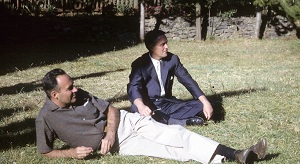Wofford/Shriver/King in the Fog of Political History
 This afternoon while having lunch I caught Andrea Mitchell’s program on MSNBC. Around 1:45 EST she was interviewing Mark Shriver on his book about his Dad, A Good Man. Early in this interview, they started to talk about Sarge and his friendship with Martin Luther King back in Chicago when Shriver was head of the Board of Education for the City. Next, they shifted to Kennedy nomination and the famous spontaneous phone call that JFK made to Coretta King on the day her husband had been tossed into a jail for a civil rights protest. It was a politically risky telephone call by Kennedy, and any one his advisers would have stopped it, had they been in the room. It turned out to be a key political gesture by Kennedy and turned the Black Vote for him that November.
This afternoon while having lunch I caught Andrea Mitchell’s program on MSNBC. Around 1:45 EST she was interviewing Mark Shriver on his book about his Dad, A Good Man. Early in this interview, they started to talk about Sarge and his friendship with Martin Luther King back in Chicago when Shriver was head of the Board of Education for the City. Next, they shifted to Kennedy nomination and the famous spontaneous phone call that JFK made to Coretta King on the day her husband had been tossed into a jail for a civil rights protest. It was a politically risky telephone call by Kennedy, and any one his advisers would have stopped it, had they been in the room. It turned out to be a key political gesture by Kennedy and turned the Black Vote for him that November.
Andrea Mitchell directed the MSNBC conversation this afternoon and Mark went along, agreeing with her as she detailed how it had happened., and all the while I waited for the other shoe to drop. I waited for Mark to raise his hand and say, “But Andrea, what really happened….”
The other shoe didn’t drop.
The other shoe was the fact–reported every-which-way from here to the history books–that Shriver was urged to have JFK call Coretta King by Harris Wofford, then working with Shriver on the Kennedy campaign, and who was also a good friend of Martin Luther King. Shriver took Wofford’s suggestion and ran with it. Harris, who later became Kennedy’s point person on civil rights in the White House, and with Shriver created the Peace Corps before going off in 1962 to become the agency’s first CD in Ethiopia, as well as, the Peace Corps Representative for all of Africa.
Now, it’s a detail, I know. Maybe it is a minor detail. But it was first reported in Ted White’s The Making of a President, way back in 1961, as a key element of that election, and later identified as one of the most politically astute moves of that campaign, or any presidential campaign.
Now, I know Mark is on a roll talking about his new book, and I know, too, that he interviewed Wofford about his Dad, but before all of us lose our collective memories, I just wanted to get that basic fact down on this blog. Harris has done a lot for the Peace Corps, JFK, and all of us who were his first PCVs in Ethiopia.
You should write to Andrea Mitchell with a cc to Mark
I’ll ship your blog’s url to Harris. He’ll get a kick out of all this.
I like to think of Harris playing critical roles in the election of three presidents:
1. Kennedy, (with this piece of history).
2. Clinton. Wofford senatorial election win in PA demonstrated to Clinton’s campaign that a Democrat could win an election. Clinton recognized the importance of this when he asked the newly-minted Senator Wofford to escort him to the dais for his first State of the Union address.
3. Obama. As one of his important surrogates, Obama asked Harris to introduce him for the most critical speech of his campaign: Obama’s relationship with the radical Chicago preacher which was about to undo the campaign.
Here is Obama, Wednesday, December 5, 2007, in Mt. Vernon, IA about to discuss national service:
“It is an honor to be introduced by Harris Wofford – one of America’s greatest advocates for public service. Starting with the civil rights movement and the Peace Corps, Harris and a generation of Americans answered a call to service. At a pivotal moment in our history, they stood up; they changed America; and they changed the world.”
Tom Hebert
As I have said before, Harris’ idea saved the world. Kennedy was elected by a small margine of around 10,000 barely beating Nixon. 1960 was the first election in which exit polls were conducted. Harris in his book says that the most important thing about the incident was that for the next several days, post cards went out to influential African-Americans telling of Kennedy’s actions. I bet those exit polls would show that those post cards got folks to the polls and made the difference. I came to this conclusion after reading the WH Kennedy tapes on the Cuban Nuclear crisis. The president was most often the only one in those conversation asking the question, do we want to start a nuclear war? Even Bobby Kennedy was advocating bombing Cuba and the Russians, as were nearly all of the advisors with whom the president spoke. And, I recall VP Nixon’s confrontation with Kruschev at a mid-western state fair that took place in a model kitchen at the fair. Nixon was pointing out the advantages of the “capitalist” kitchen and Kruschev was challanging him about civil rights, or the lack there of, and poverty. There is not doubt in my mind that when push came to shove, Nixon would have hit the red button.